I like to wonder what hockey purists from 50, or 100, or even as recent as 30 years ago would think if they saw some of the things happening around the NHL today. The Toronto Maple Leafs haven’t won a Stanley Cup in more than half a century. Connor McDavid is unlike any player we’ve seen before. Goons are nigh-nonexistent, and even physicality is significantly less pertinent in today’s game. Lacrosse goals have happened thrice in a little over a calendar year. Then, there’s this upcoming series.
That’s right, folks, we get a playoff series between two southern markets, and it will be a lot of fun to see two fantastic hockey towns face-off in a series rife with tailgating, fun traditions, and raucous buildings.
Both teams are entering the playoffs hot, but the head-to-head matchup has not been competitive over the last half-decade. The Hurricanes have won 13 of the last 16 against the Predators; two of those losses were last week when a desperate Nashville squad was fighting for their lives against an already-clinched Hurricanes lineup. But, the past will have no bearing on this series, which should be close. Here’s everything you need to know with a position-by-position breakdown and what the Hurricanes have to do to prove themselves as a legitimate Stanley Cup contender.
Offense
The Hurricanes rose to prominence on the strength of their blue line, but the reason they have a chance to win the Stanley Cup is because of their forward ranks. When it is clicking, their top-six matches up with any the franchise has ever had, including the 2006 Cup Champion team. The top line of Andrei Svechnikov, Teuvo Teravainen, and Sebastian Aho is one of the deadliest in hockey, with three immensely talented stars capable of catching fire at any moment. It is the type of line that can single-handedly win a series. They will be a handful for Nashville to match up against.
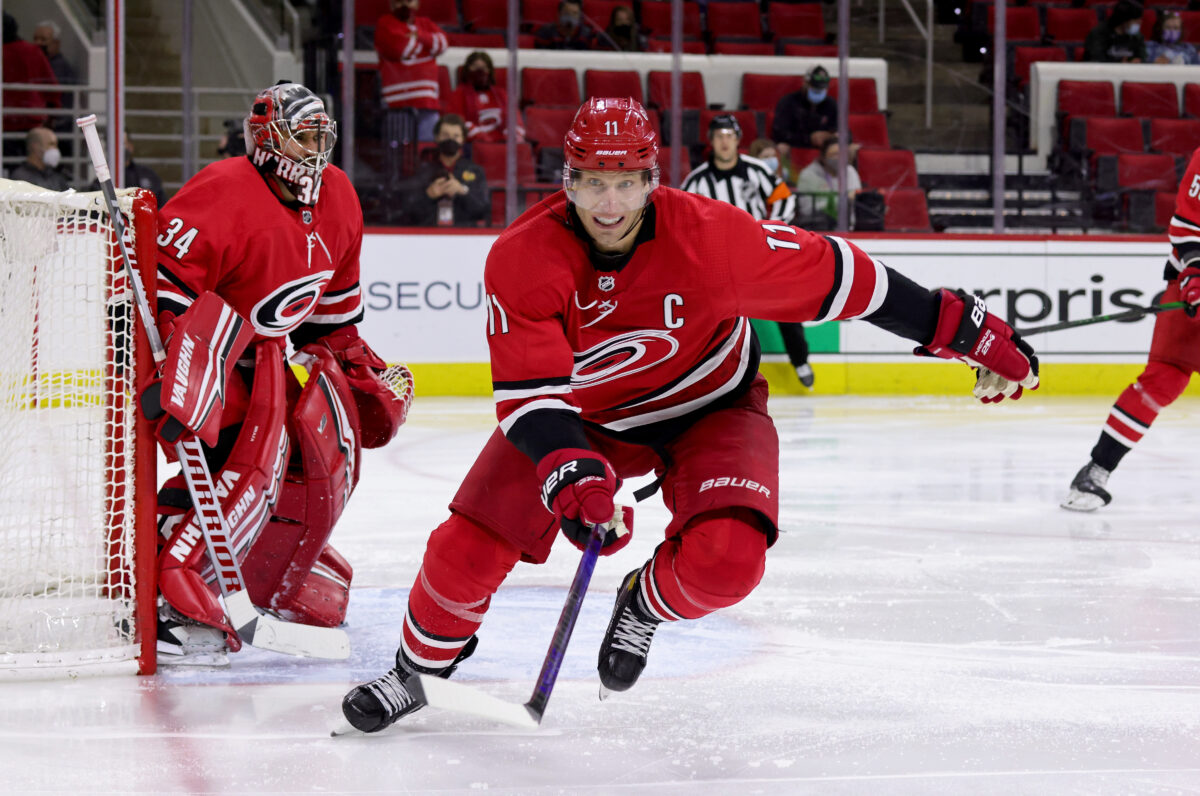
The second line, centered by Vincent Trocheck and flanked by Nino Niederreiter and breakout playmaker Martin Necas, has taken a lot of pressure off the Hurricanes’ top line. However, Trocheck, after an incredible start to the season when he led the team in goals, has really fallen off with just four assists in his last nine games. He also hasn’t scored a goal since April 15, a span of 14 games. The Hurricanes desperately need that line to get going again if they are to advance.
The bottom-six has also been fantastic for the ‘Canes, with Jordan Staal turning in a monster season, Warren Foegele and Jesper Fast providing solid, veteran depth, and the young fourth line of Steven Lorentz, Morgan Geekie and Max McCormick emerging and producing far more than expected. That bottom unit provides a ton of energy and has been a real bright spot for the Hurricanes. They will have their hands full with Nashville’s fourth line, though. Brock McGinn is one of the most important, and under-appreciated, depth players in the league, with his ability to slide up and down the lineup, provide excellent defense and penalty killing, and set an example with his work ethic. He always seems to step up his game in big moments. He has not played in over a month, and few updates have been provided, but the Hurricanes need him back.
For the Predators, the forward lines are likely to look something like this:
Filip Forsberg – Ryan Johansen – Eeli Tolvanen
Calle Jarnkrok – Mikael Granlund – Luke Kunin
Viktor Arvidsson – Erik Haula – Matt Duchene
Yakov Trenin – Colton Sissons – Tanner Jeannot
(Thanks to Predators THW contributor Alex MacLean for help with their lineup configuration)
Some of the big names on the Nashville roster have struggled through tough seasons – which is why it took a torrid late run for them to sneak into the postseason. Arvidsson missed the last six games with an undisclosed injury (but is expected back for the opener), while Forsberg missed 17 games. Johansen missed eight and struggled mightily when he was in the lineup with just 22 points in 48 games, and Duchene struggled in his second season with the Preds, scoring just six goals in 34 games; if you recall, two of those came in the finale against the Hurricanes’ B-list lineup. Still, there is a lot of talent on the Preds, and it is well-distributed.
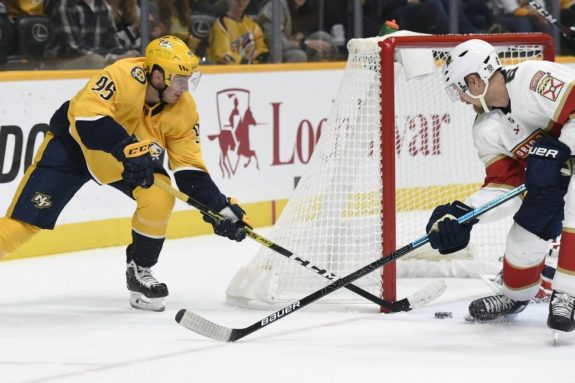
Players like Jeannot and Kunin are hardworking, aggressive, and gritty forwards, the type of player that Hurricanes head coach Rod Brind’Amour would love to have in his own lineup. Nashville has good speed in its forward group and has shown the ability to get out on the rush and score in transition. This can cause problems for the Hurricanes with their aggressive blueliners regularly pinching and joining the rush. The Hurricanes must be conscious of these skilled players in the top nine.
But, the line that has propelled the Predators of late has been their bottom one. Trenin, Sissons, and Jeannot, who was only recently recalled from the Hurricanes and Preds’ shared AHL team in Chicago, has been a fast, physical, tone-setting fourth line that has provided juice for the team. Rarely does a fourth-line matchup determine the outcome of a postseason series, but that may be the case in this one. Geekie’s unit has done the same thing for the Hurricanes at times, so it’ll be a storyline to follow to see if they can keep up with Nashville’s physical presence and sway that energy and momentum in Carolina’s favor.
Latest Hurricanes Content:
- Hurricanes’ 2024-25 Pipeline: Illinois to Carolina
- Hurricanes Mailbag: Season Outlook, Roster Moves & Strength of Schedule
- Maniscalco Discusses the Hurricanes’ Offseason Moves, Management & More
It will also be interesting to see who Brind’Amour matches Staal’s line up against, although he has shown he trusts Trocheck and Aho’s lines to check scorers this season, so he may not be terribly concerned with matchups. All four Nashville lines are capable, but the Hurricanes should feel relatively good about most matchups if they get caught after an icing or long shift.
On paper, the advantage certainly goes to Carolina, but playoff games aren’t played on paper. But, if the series turns into a high-scoring one, the Hurricanes should feel good about their firepower on their forward ranks.
Defense
Both of these teams are built from the back end out. Serious defensive star power will be on display in this series, led by two elite, #1 defensemen in Roman Josi and Jaccob Slavin.
Unfortunately, Slavin left the penultimate game of the season with an undisclosed injury. The team is hoping he’ll be active for Game 1; even Slavin at 50% is huge for the Hurricanes. But, this team’s ceiling shrinks substantially without a fully healthy, at-his-best, #74, especially if you consider the lineup changes he would bring with him pushing a struggling Brady Skjei onto the top pairing and Jake Bean into the top-four, which the rookie power-play specialist is ill-equipped to handle at this stage.
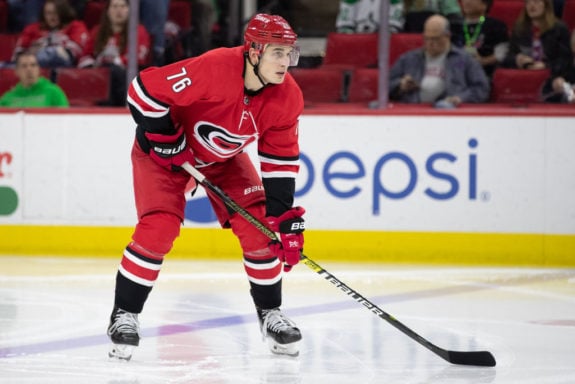
Skjei turned a corner and was playing the best hockey of his Hurricanes career before a high hit from the Tampa Bay Lightning’s Blake Coleman resulted in a concussion in April. Since returning, he looks a bit unsure, his reactions have seemed a touch slow, and he’s been victimized in his own end often. The Hurricanes need him to get his legs back during this break. The duo of Skjei and Brett Pesce has been excellent in the past, and when the team’s top-four is healthy and clicking, it is suffocating.
One of the biggest questions heading into the postseason is what kind of role the third pairing will have – or even who will be on it. Bean has had ups and downs like any rookie offensive defenseman. Lately, he has had more ups and has seemed much more confident jumping into the play and getting himself into a position to play to his strengths. He only has one goal, but many fantastic saves by opposing goalies come to mind when thinking of him. He could easily have a few more.
Deadline acquisition Jani Hakanpää scored two big goals for the Hurricanes and provides a good amount of physicality, but his skating and awareness have caused concerns of late. Obviously, you can’t roll two defensive pairings, but how much will Brind’Amour trust these two – especially Bean – to play? And what happens if his play crumbles even further in a physical series, and he ends up getting hemmed in constantly?
The Hurricanes don’t have Haydn Fleury to fall back on anymore, and Jake Gardiner has missed most of the season with a recurring back issue. Rust will be an issue for him, as he only got in the final game of the season – in which he struggled mightily. His mobility looks nearly shot, and it’s questionable that, even if Bean struggled, Gardiner could do much to upgrade that spot.
The Hurricanes normally trust their defense implicitly, but there are a few questions with a banged-up Slavin and inconsistent bottom pairing that must be answered right away. Both could sink the team’s playoff chances; I don’t think the Slavin-less Hurricanes are a contender, and opponents will feast on the bottom pairing at one point or another if they prove they can’t hang.
Josi, Nashville’s captain, is widely recognized as one of the best defensemen on the planet, winning the 2020 Norris Trophy thanks to his monstrous point totals and all-around excellence. He is effectively a forward when Nashville is trailing, and his elite mobility, hockey IQ, and offensive skills make him a threat every time he is on the ice. He will likely be paired with another excellent mobile offensive defenseman in Ryan Ellis. When those two are on the ice, the Predators often have five players you can’t take your eyes off of. This is a dangerous proposition, as expecting five players to stick to their assignment for an extended period with no momentary breakdowns is unlikely. Expect them to see a ton of the Aho unit and try to keep that line hemmed in their own end.
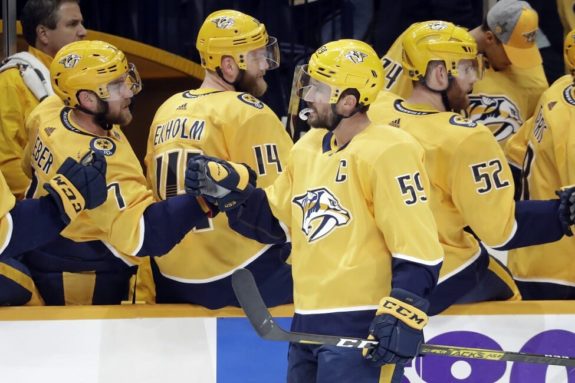
On the second pairing, veteran Mattias Ekholm is likely to play with 2016 first-round draft pick Dante Fabbro. Ekholm has a history with Svechnikov, and the two went after each other on many occasions during the season series. If the series gets nasty, don’t be surprised to see these two in the middle of it. Ekholm is a pretty underrated defenseman, one whose offense really took off over the last four seasons. He also provides a solid veteran presence for Nashville. Meanwhile, Fabbro hasn’t had the offensive success in the NHL that he had in the BCHL and NCAA, but has been steady in his own end the last two years and clears the front of the net effectively. With a small goaltender in Juuse Saros behind him, that’s quite valuable.
The third pairing for Nashville will consist of some combination of Matt Benning, Alexandre Carrier, and Erik Gudbranson. Carrier is the best puck-mover of the three, while Gudbranson provides his value with physicality and the ability to clog the middle of the ice. Nashville head coach John Hynes may be hesitant to play a Gudbranson-type (Ben Harpur would fall into this category) given that the Hurricanes have home-ice advantage and last change; the Hurricanes’ speed and skill could feast upon a big, lumbering defenseman. Much like the Hurricanes, the bottom pairing will have to be sheltered. Both coaches will be looking to take advantage of these matchups.
In all, the Predators possess one of very few defensive units that remotely match up with the Hurricanes’ in the league, and both top-fours are extremely talented. Because of this position – as well as the one we’re talking about next – there’s a very good chance this series is tight-checking and low scoring.
Goaltenders
Our last position is possibly the most fascinating from the Hurricanes’ point of view. Do they want to roll with Petr Mrazek, who has been the guy each of the last two seasons? Or has Alex Nedeljkovic earned it, stepping in and providing one of the best regular seasons from a goalie the Hurricanes have had in… ever?
It’s a tough choice and one that could feasibly go either way. Brind’Amour does have a tendency to roll with his veterans, and there’s a lot of merit to that, especially in the postseason. On the other hand, Nedeljkovic has been a big game player his entire career, dating back to his OHL and, especially, international days. The kid stepped in when Mrazek went down early in the season and was consistently spectacular.
Mrazek was far from a slouch himself, but his play has been more inconsistent since his return from injury and rust is potentially a factor. He had a .962 save percentage (SV%) after his first five starts; that number was just .908 his last five – if you don’t include the five goals allowed the last game of the season with the ‘Canes resting most of their top players, including their top three defensemen. That game included, the number drops to .892 in the last 6 games.
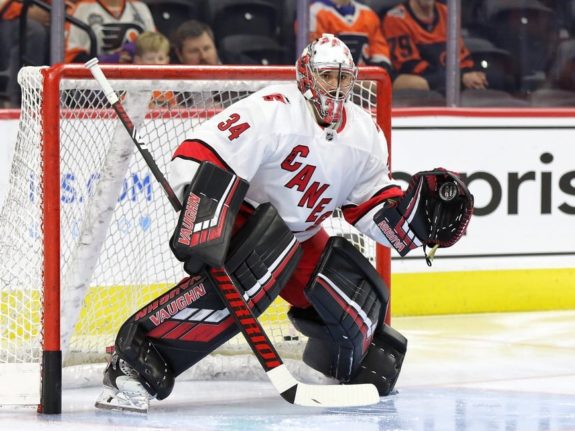
And, yes, while that game should be thrown out, there were still some concerns about Mrazek. His angles and timing seemed completely out of whack. He is always an aggressive goalie who moves side to side in a hurry, almost recklessly, but he was out of position a lot on that night. It’s enough to at least give Brind’Amour pause. Either way, the Hurricanes have two goalies who have proven to be excellent. If one falters, the other will be ready to jump in. Still, you don’t want to sacrifice a game in this series to figure it out, which makes this decision one of the most important Brind’Amour must make ahead of Game 1.
I would be remiss not to mention James Reimer. Brind’Amour has said, on multiple occasions, that the Hurricanes are comfortable with all three players. While I don’t doubt that, the choice is clearly between the two younger options. If Reimer sees any time at all, it’s probably a very, very bad sign for the Hurricanes.
There is no question for Nashville, meanwhile, as Juuse Saros has been and will be the guy for them. Longtime star Pekka Rinne was given a fantastic sendoff with the shutout victory to wrap up the regular season, which was a touching way for a player who has given so much to the organization to go out. Make no mistake, though, the net is Saros’.
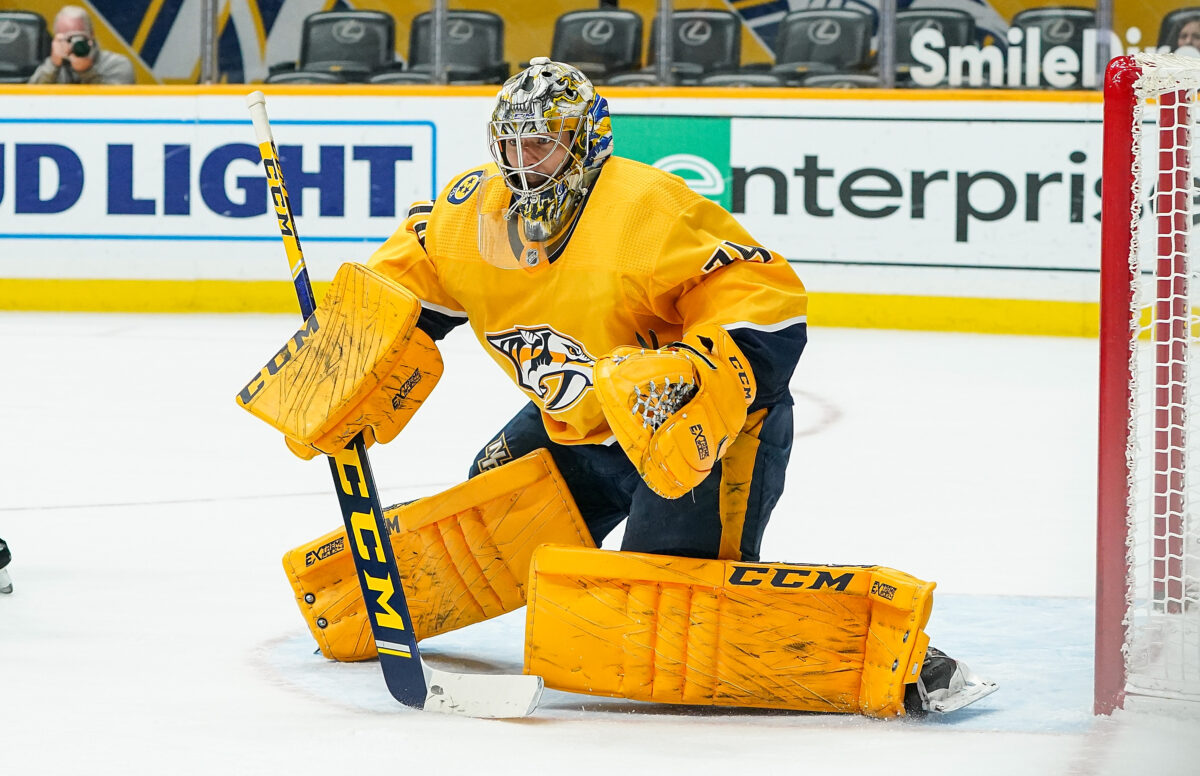
One of the biggest reasons the Predators went from being an afterthought to a playoff team was the Finnish netminder. After middling results to begin the season, he posted a .963 SV% in March, .929 in April, and .935 in his three May starts. He has been stellar for a long stretch, and the diminutive goalie has proven to be extremely agile, flexible, and flat-out hard to beat. He has fantastic angles and rebound control, and tracks the puck through the trees extremely well for a goaltender of his size. One of the scariest propositions in the postseason is a hot goalie, and few have been hotter than Saros down the stretch. The Hurricanes need Mrazek or Nedeljkovic to at least match him, which could be a tall task.
Three Burning Questions for the Hurricanes
With the rosters broken down, there are three questions the Hurricanes must answer to advance to the second round:
- Can the Hurricanes Match the Predators’ Physicality?
The Hurricanes identified grit and physicality as areas for improvement during the season, and they made moves for both Cedric Paquette – who probably won’t be in the lineup – and Hakanpää during the regular season. This was probably a shrewd move, as nobody on the Hurricanes consistently brought the physical presence you need to have in the playoffs to keep opponents from taking too many liberties with your stars. Being a bruising team goes a long way towards wearing the other team down, drawing penalties, and exerting your will upon your opponent. The Boston Bruins did this to the Hurricanes last season.
I thought it was a great sign when the Lightning snatched an April game with big hits including Killorn knocking Necas from the game, and the Hurricanes bounced back with a win the very next night (can someone explain why Gardiner was the one to step up?). They didn’t back down, and they have to continue to answer the bell when teams try to muck up the game. The Predators set the tone in the last two games of the regular season. The series is likely to get nasty in a hurry because they know they will be out-run if the series becomes a skills competition.
They must create chaos, havoc, and, probably a parade to the box one way or another to try to give them some sort of an advantage. The Hurricanes must show their discipline and counterpunch is playoff-ready, or else they won’t last long in the postseason; even if they still find a way to take down Nashville. - @Power Play, You Ok?
The Hurricanes spent much of the year ranked #1 on the power play, and the penalty kill was top-10 before a monstrous final stretch of the season propelled it to #3. Lately, though, the power play has been a train wreck. The players have been stationary, making it far too easy for the penalty kill to defend against them and clog the lanes; the Hurricanes lacked urgency, constantly losing races and puck battles, and they’ve bled odd-man rushes against and shorthanded goals for their opponents. Not great.
The break before May 17 will give Brind’Amour time to spend on the unit and try to get his players moving the puck and themselves more efficiently again. They have a ton of skill, so there’s no reason they can’t regroup. All mistakes are magnified in the playoffs. They need to be able to take advantage of penalties. Getting the power play back on track should be one of the Hurricanes’ top priorities right now. - Will the Depth Scoring Continue?
Between Necas’ monster season, Niederreiter’s impressive bounce-back, Staal’s offensive explosion, and Trocheck’s seamless fit, a lot has gone right for the Hurricanes this season. I outlined many of them last week. However, those guys combined for a whopping eight total points in the eight games between the play-in series and first round against the Bruins last season. Necas, in particular, was completely shut down after a hot start against the New York Rangers. His game is predicated on speed and skill, so he has to answer questions as to whether he can keep up in a physical, grinding playoff series. All these players have been paramount to the Hurricanes’ success, and if the team has to rely on the Aho line for all its offense too often, they could be in trouble.
Final Thoughts
This should be a fun, grinding series with stellar defensive play and goaltending. The Hurricanes have the upper hand on paper, as they did in the regular season, but the adage, “throw the regular season out once you hit the playoffs,” exists for a reason. At this juncture, anyone can beat anyone; that’s part of what makes the NHL playoffs so much more intriguing than other sports. Who wants to watch Tom Brady and LeBron James win another ring? Nah, give me North Carolina’s Hurricanes.
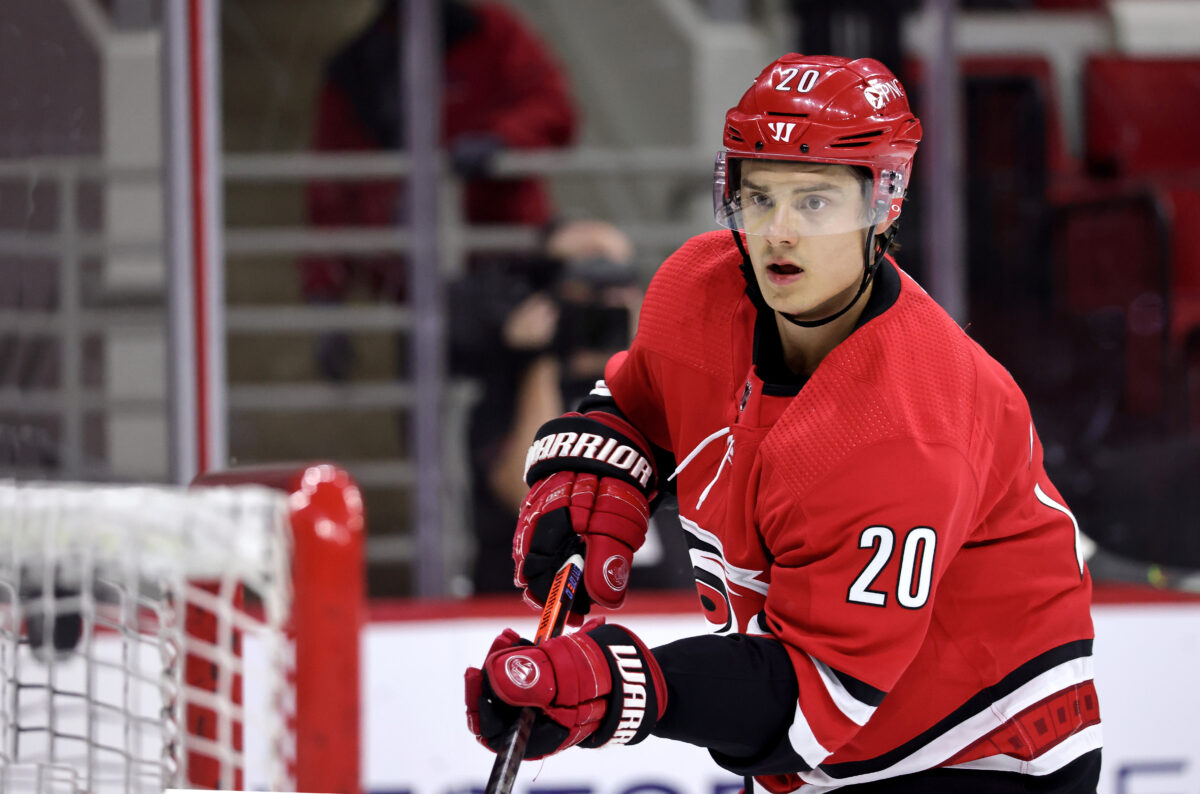
This franchise should feel really good about where they are. They have two excellent goalies to turn to, and a stacked, balanced roster that Brind’Amour and Don Waddell have built and tweaked for the last four years. Their time is here. It’s no longer enough for the Hurricanes to make the playoffs, as this is the third consecutive year; anything less than a Finals appearance will feel like a disappointment.
It all starts with taking the Nashville Predators seriously. They can and should look to come out hot, set the tone for themselves, and take care of the series like they’re capable of. I maintain that when this Hurricanes team is on, it can and will beat anyone in the league. The consistency has been the only thing missing, but look for Brind’Amour to have the team hungry and firing on all cylinders out of the gate.
Notable Stats
Nashville Predators: goals for per game (GF/G): 2.65 (23rd); goals against per game (GA/G:) 2.70 (10th); team SV%: .920 (T-3rd); Power Play percentage (PP%): 17.6% (24th); Penalty Kill percentage (PK%): 75.4% (29th)
Leading scorers
1. Roman Josi – 48 Games Played (GP); 8 goals, 25 assists, 33 points
2. Filip Forsberg – 39 GP; 12 goals, 20 assists, 32 points
3. Calle Jarnkrok – 48 GP; 13 goals, 15 assists, 28 points
Goalie Stats:
Juuse Saros: 22-11-1, .927 SV%, 2.28 goals-against average (GAA)
Pekka Rinne: 10-12-3, .907 SV%, 2.87 GAA
Carolina Hurricanes: GF/G: 3.13 (11th); GA/G: 2.39 (3rd); team SV%: .920 (T-3rd); PP%: 25.6% (2nd); PK%: 85.2% (2nd)
Leading Scorers
1. Sebastian Aho: 56 GP; 24 goals, 33 assists, 57 points
2. Vincent Trocheck: 47 GP; 17 goals, 26 assists, 43 points
T-3. Dougie Hamilton: 55 GP; 10 goals, 32 assists, 42 points
T-3. Andrei Svechnikov: 55 GP; 15 goals, 27 assists, 42 points
Goalie Stats:
Alex Nedeljkovic: 15-5-3, .932 SV%, 1.90 GAA (1st in NHL amongst qualified goaltenders SV% and GAA)
Petr Mrazek: 6-2-3, .923 SV%, 2.06 GAA
James Reimer: 15-5-2, .906 SV%, 2.66 GAA
2020-21 Season Head-to-Head (home team listed first)
January 18: Predators 2, Hurricanes 4
March 2: Predators 2, Hurricanes 4
March 9: Hurricanes 3, Predators 2 (OT)
March 11: Hurricanes 5, Predators 1
April 15: Hurricanes 4, Predators 1
April 17: Hurricanes 3, Predators 1
May 8: Predators 3, Hurricanes 1
May 10: Predators 5, Hurricanes 0
*All stats via ESPN
Should be a fun one; check back with The Hockey Writers for updates throughout the series, and sit back and enjoy the best postseason in sports!